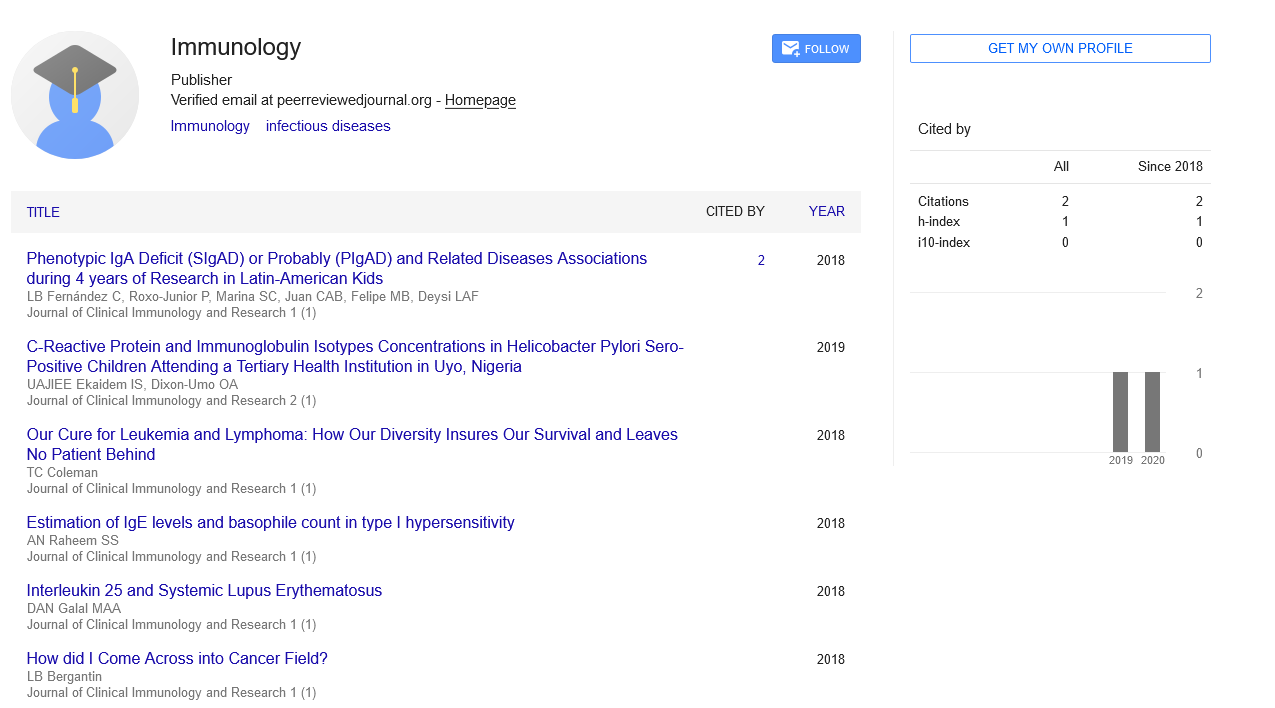Short Communication, J Clin Immunol Res Vol: 6 Issue: 3
Autoimmune Diseases and the Gut Microbiome: Exploring the Connection
Maria Ruth*
1Department of Immunobiology, Yale University, New Haven, USA
*Corresponding Author: Maria Ruth,
Department of Immunobiology, Yale
University, New Haven, USA
E-mail: ruthmaria65@gmail.com
Received date: 02 September, 2023, Manuscript No. JCIR-23-116294;
Editor assigned date: 04 September, 2023, PreQC No. JCIR-23-116294 (PQ);
Reviewed date: 18 September, 2023, QC No. JCIR-23-116294;
Revised date: 25 September, 2023, Manuscript No. JCIR -23-116294 (R);
Published date: 05 October, 2023, DOI: 10.4172/JCIR.100087.
Citation: Ruth M (2023) Autoimmune Diseases and the Gut Microbiome: Exploring the Connection. J Clin Immunol Res 6:3.
Abstract
Description
Recent research has illuminated a complex interplay between the gut microbiome and autoimmune diseases [1]. The relationship between the gut microbiota and autoimmune conditions, emphasize how dysbiosis, molecular mimicry, and immune modulation in the gut may contribute to disease development and potential therapeutic interventions [2].
Autoimmune diseases, characterized by immune responses against the body's own tissues, affect millions worldwide. Recent investigations have uncovered a surprising link between the gut microbiome and the development of autoimmune diseases [3].
Gut microbiome
The gut microbiome is a dynamic ecosystem consisting of trillions of microorganisms, including bacteria, viruses, fungi, and other microorganisms. This community plays a pivotal role in digestion, metabolism, and immune system development and function [4].
Dysbiosis: Dysbiosis refers to an imbalance in the composition and function of the gut microbiota, often characterized by a reduction in beneficial microbes and an increase in potentially harmful species. Dysbiosis has been implicated in various autoimmune diseases..
Multiple Sclerosis (MS): Studies have revealed differences in the gut microbiome of individuals with MS, including decreased diversity and altered microbial composition, suggesting a potential role of dysbiosis in disease susceptibility [5].
Molecular mimicry: Molecular mimicry occurs when microbial antigens resemble host antigens, leading to cross-reactivity and autoimmune responses. The gut microbiome can contribute to molecular mimicry by exposing the immune system to microbial antigens that resemble self-antigens [6].
Rheumatoid Arthritis (RA) and citrullination: In RA, certain gut bacteria possess enzymes that can citrullinate host proteins, creating neoantigens that trigger an immune response against self-tissues [7].
Immune modulation: The gut microbiome plays a important role in shaping the development and function of the immune system. Microbial metabolites, such as Short-Chain Fatty acids (SCFAs), can modulate immune responses, either promoting inflammation or dampening excessive immune reactions [8].
Inflammatory Bowel Disease (IBD) and Immune dysregulation: IBD, which involves chronic inflammation of the gut, showcases how dysbiosis can lead to immune dysregulation. Altered microbial communities in IBD can disrupt the balance between proinflammatory and anti-inflammatory immune responses.
Therapeutic interventions: The emerging understanding of the gut microbiome's role in autoimmune diseases has sparked interest in therapeutic interventions that target the Microbiota [9].
Probiotics and prebiotics: Probiotics, live beneficial bacteria, and prebiotics, which nourish these bacteria, are being explored for their potential to restore gut microbial balance.
Fecal Microbiota Transplantation (FMT): FMT involves transferring fecal material from a healthy donor to a patient with dysbiosis. It has shown results in conditions like Clostridium difficile infection and is being investigated for autoimmune diseases. The gut microbiome is highly complex, with individual variation and dynamic changes over time, making it challenging to pinpoint specific microbial signatures [10].
Establishing causality between gut dysbiosis and autoimmune diseases is a complex task, and more research is needed to confirm these relationships.
Personalized approaches: Tailoring interventions based on an individual's microbiome presents logistical and ethical challenges.
Conclusion
The relationship between the gut microbiome and autoimmune diseases is a burgeoning field of research with far-reaching implications for understanding disease pathogenesis and developing novel treatments. Dysbiosis, molecular mimicry, and immune modulation in the gut microbiota are all potential mechanisms contributing to autoimmune disease development. The insights into this connection, personalized interventions targeting the gut microbiome offer hope for patients with autoimmune diseases. Collaborative efforts among researchers, clinicians, and the pharmaceutical industry are essential in advancing our understanding of the gut-autoimmunity relationship and translating this knowledge into effective therapies. Understanding the gut microbiome's role in autoimmune diseases may pave the way for innovative treatments that harness the potential of our internal microbial allies in promoting health and mitigating autoimmune responses.
References
- Belkaid Y, Hand TW (2014) Role of the microbiota in immunity and inflammation. Cell 157(1): 121-141.
[Crossref] [Google scholar] [Pubmed]
- Manfredo VS, Hiltensperger M, Kumar V, Zegarra RD, Dehner C, et al. (2018) Translocation of a gut pathobiont drives autoimmunity in mice and humans. Science 59(6380): 1156-1161.
[Crossref] [Google scholar] [Pubmed]
- Gensollen T, Iyer SS, Kasper DL, Blumberg RS (2016) How colonization by microbiota in early life shapes the immune system. Science 352(6285): 539-544.
[Crossref] [Google scholar] [Pubmed]
- Honda K, Littman DR (2016) The microbiota in adaptive immune homeostasis and disease. Nature 535(7610):75-84.
[Crossref] [Google scholar] [Pubmed]
- Round JL, Mazmanian SK (2009) The gut microbiota shapes intestinal immune responses during health and disease. Nature Reviews Imm 9(5): 313-323.
[Crossref] [Google scholar] [Pubmed]
- Wu HJ,Wu E (2012) The role of gut microbiota in immune homeostasis and autoimmunity. Gut Microbes 3(1): 4-14.
[Crossref] [Google scholar] [Pubmed]
- Berer K, Mues M, Koutrolos M, Rasbi ZA, Boziki M, et al. (2011) Commensal microbiota and myelin autoantigen cooperate to trigger autoimmune demyelination. Nature 479 (7374): 538-541.
[Google scholar] [Pubmed]
- Ochoa JR, Mielcarz DW, Wang Y, Begum HS, Dasgupta S, et al. (2010). A polysaccharide from the human commensal Bacteroides fragilis protects against CNS demyelinating disease. Mucosal Imm 3(5): 487-495.
[Crossref] [Google scholar] [Pubmed]
- Ruff WE, Greiling TM, Kriegel MA , Hostetter JM (2020). The role of the gut microbiota in host metabolism through the regulation of gut hormone release. Frontiers in Physio 11: 148.
[Google scholar] [Pubmed]
- Vatanen T, Kostic AD, d'Hennezel E, Siljander H, Franzosa EA, et al. (2016). Variation in microbiome LPS immunogenicity contributes to autoimmunity in humans. Cell 165(4): 842-853.
[Google scholar] [Pubmed]
 Spanish
Spanish  Chinese
Chinese  Russian
Russian  German
German  French
French  Japanese
Japanese  Portuguese
Portuguese  Hindi
Hindi 